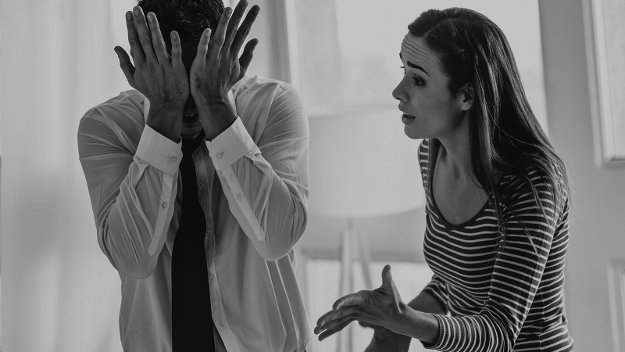Caught in a Bad Romance: How Millennials Navigate Mental Health Issues in Relationships

Even though depression is nothing new, it’s clear that the health issue is on the rise in millennials. From 2013 to 2016, depression diagnostics have increased 47 percent in adults ages 18 to 34 years old. Oddly enough, statistics also show that millennials had a 39 percent decline in marriage in 2014 and also have low levels of social trust. Only 19 percent of millennials believe that most people can be trusted.
Trust plays an important role in romantic relationships. There is also a cause and effect between mental health disorders and people’s ability to trust. Similarly, there is also a link between how dating with a mental health disorder can make an impact on romantic relationships. So does this mean millennials are doomed to find healthy, happy, and successful romantic relationships given the rise of mental health issues?
Interviews with eight millennials who spoke about their experiences with a mental health disorder and being involved in a romantic relationship revealed some important points to consider when one person in a relationship either shows signs of or confirms that they have a mental health issue.
Every person interviewed has had different experiences—whether it was the interviewee being the one with a mental health disorder or their partner having issues. Other experiences involved each person in the relationship having a mental health disorder and how they maintain a healthy relationship with their partner. In some cases, the relationship ended due to issues that arose out of the mental health disorder. In others, the couples are still together and are learning to how maintain a healthy relationship.
Each interviewee revealed eye-opening lessons they learned. One being that not everyone handles stress, anxiety, depression, or their emotions in the same way. Most interviewees explained that their partner processes their mental health disorder differently than they would. The challenge is figuring out what helps each individual and to accept those healthy coping mechanisms.
Natalie* (age 21) is a verbal processor. She says that talking about her anxiety or feelings helps her understand why she’s feeling a certain way -- thus, making it easier to move forward. Her boyfriend on the other hand does not process through talking. She says he is someone who has difficulty sharing when he is depressed. Mainly because he feels like sharing would burden Natalie by “putting more stress on her.” He is someone who needs to have space in order to process his feelings privately. Natalie said sometimes this is hard because she wishes he would share the same amount of vulnerability with her as she does with him. However, she says she’s learned to accept that her boyfriend processes his feelings differently.

Natalie used to take it personally and feel helpless when she felt she couldn’t provide the same support he gave her when she was having a panic attack or on days where it was difficult for her to take care of herself. Yet, they were able to communicate about what they would need in moments when a mental health disorder acts up.
“I think it helps to have conversations ideally when you’re feeling OK and in the right state of mind to be able to express more clearly what you’re feeling and what your needs are. It helps to also have those conversations ahead of time, almost to plan and prepare for those moments when communication may not be rational,” said Natalie. “For example, you and your partner can say things like ‘When I’m feeling like s**t, this is exactly what I need’ or ‘These are the ways you can show up for me when you can.’ Especially if I’m having a panic attack or a flashback because in that moment, I am not able to communicate what my needs are.”
It takes communication, honesty, and trust to be able to figure out what ways someone processes and navigates their mental health. That balance includes talking to a significant other about what one may need or how to support each other when their emotions or anxiety become overwhelming.
*Aurora, age 21, shares how important maintaining strong communication has helped her in her five-year relationship. Aurora experiences depression coupled with ADHD.
She said she didn’t know she had either of those conditions for a long time but was aware that she was struggling with completing certain tasks that required a lot of focus such as doing homework. Aurora felt like something was “wrong with her” because homework appeared to be a simple task to others.
Having a difficult time concentrating made her feel inadequate, which doesn’t help when feeling depressed. Aurora often would shut down and beat herself up for sensing a lack of productivity. Not knowing the reason behind this but knowing how she felt made it difficult for her to communicate this with her boyfriend.

“Not knowing what it was, I would unknowingly project what I was feeling onto my boyfriend. If I didn’t want to talk, I just wouldn’t talk to him and instead would be angry,” said Aurora.
Aurora ended up getting diagnosed for ADHD and starting seeing a therapist. This changed her perspective dramatically. She started recognizing when her feelings or actions were symptoms of depression or ADHD, helping her to stop negative thought spirals and taking healthier actions to feel better. As a result, she became better at communicating with her boyfriend in ways that didn’t project.
“(Getting diagnosed and being in therapy) made it a lot easier to recognize when I didn’t talk. It made it easier to be able to tell my boyfriend, ‘I love you but I’m not feeling that well today,’ in order to have the space to process and overcome those feelings by myself,” said Aurora.
It is also important to set boundaries in relationships when these issues arise. It is not the responsibility of another person to fix or heal someone else’s issues. Nor is it fair for someone to expect their partner to do that work for them.
A lack of setting boundaries in a relationship can make it easier for that expectation to transform into codependency -- thus, adding more pressure, tension, and strain onto the relationship.
Oliver*, 24, learned what impact codependency had on one of his previous relationships. He said while communication is valuable, they were too focused on talking things out to the point where the relationship became imbalanced. A lot of the focus became fixated on “fixing” the problems that existed around his partner’s mental health that it took time away from acting on self-care on both ends.

Oliver learned the importance of stepping back and recognizing where space would have been necessary in order to take care of himself. “It all happened so quickly. Sometimes it can be hard to say what you need [to your partner] when you’re feeling overwhelmed,” said Oliver. “I think that by staying in tune… whether it be journaling, meditating, or speaking to a therapist in order to keep track of when to say when I needed to take some space or tell my partner I needed to handle an issue a different way would have helped a lot. I think we relied on each other to the point where we relied too much on each other and burned out.”
It helps to maintain and remind someone of their own identity. It is easy to lose oneself when in a relationship when the dynamic solely is only being around and doing things for a romantic partner. It’s easy to get burned out.
A couple can be easily seen as two people becoming one unit, but this is not a healthy nor realistic dynamic. A “couple” is still composed of two individual people, who experience two different worlds outside of blending those worlds together.
“Creating an identity for yourself by having other interests and spending time around other people outside of the relationship is healthy. It can add pressure when you feel the need to only to be around your partner 24/7,” said Rita, 23. “I think what makes cool and complex relationships is when you have different things that you bring [to the relationship] and learn. Asking your partner what they did that day actually becomes a question and not an obligation.”
When a mental health issue is untreated, it can turn what could be a potential healthy and happy relationship into a toxic one. Avoiding self-work and not doing anything to cope or treat the issue can prevent proper communication, create a lack of trust, prioritize dishonesty out of fear of the reaction, and overall create anxiety around the relationship.
Some mental health disorders require more intensive treatment than others such as therapy or taking medication. When a mental health disorder is untreated, that person can become reactive and sensitive to other people’s actions or words. Their behavior becomes unpredictable, manipulative and potentially abusive. That anxiety of the unknown reaction and response creates this walking-on-eggshells dynamic in the relationship.

Obviously, most people want to live happy lives. However, sometimes when there’s a source of even slight happiness or love given to someone coping with a mental health issue who hasn’t fully navigated how to understand their feelings or thoughts, it’s easy to become attached. There comes a certain point in the relationship when it becomes comfortable. Sometimes comfort is good. In other cases, comfort can make someone unmotivated to change.
Yet, it’s not uncommon for the hope of that self-work to kick in eventually. Usually, this is why someone would choose to stay in a toxic, unhealthy, and unhappy relationship. This person believes that their partner could eventually get the help they need.
Unfortunately, this is usually not the case. Sometimes, people have to learn the hard way that change will not come until their partner chooses to accept the discomfort of self-work.
Sabrina*, age 24, learned from her experience with her ex about what effect not treating a mental health disorder has on a relationship. Sabrina’s ex-boyfriend had bipolar disorder and ADHD and was not seeking treatment for either.
Sabrina felt like she was walking on eggshells often to avoid triggering specific reactions or behaviors from her ex-boyfriend. She expressed that she put herself on the backburner for him in order to try to make him happy, even during times he was manipulative or disrespected her boundaries. Eventually, she started to realize that the endless pit of forgiveness and second chances she gave him had ran out to nothing.
“When you are unmediated, uncommitted to taking care of yourself, and aren’t accepting what is going on in your brain then that is going to make problems in your relationship,” said Sabrina. “When you aren’t reciprocating by not showing up for people who are showing up for you then that’s a problem. My experiences with dating people with outstanding mental health problems that aren’t [receiving] attention have shown me that those people don’t have time for you…I’ve also learned that I’m not a good partner when I’m in a dark place and feeling depressed.”

Once Sabrina became medicated for her depression and also observed how other people in her life with bipolar disorder navigated their mood disorder, it opened her eyes to the difference in how someone treats others when they are aware seeking therapy and treatment.
When the disorder becomes the main focus of the relationship, it becomes the sole focus of the relationship. Mental health disorders may be a part of someone, but they are not who that person is. Being able to separate these facts can make it easier to allow two individuals to work on themselves independently, while still being able to maintain a healthy, happy relationship.
Bottom line: Not setting healthy boundaries, taking space, or treating a mental health issue can create a toxic cycle that negatively impacts both people. If there is trauma or baggage from past relationships or experiences, it is important to process and move forward from that before entering a new relationship.
“Now that I’m medicated for depression, I can see a lot more clearly how that impacted my relationships…. Like, when you’re putting too much on somebody else, asking too much, using what’s happening to you in a manipulative way. I have those tendencies when I’m really depressed. It’s nice to not feel that anymore and see that my depression is only a part of me but is not me” said Sabrina. “I’ve been treated like crap because I dated someone with unchecked mental health problems, and I’ve also treated other people like crap because I’ve had unchecked mental health problems.”
*Names of these individuals have been changed in order to protect their identities.
Author Bio:
Caitlin Cohen is a contributing writer at Highbrow Magazine.
For Highbrow Magazine































































































































































































































































































































